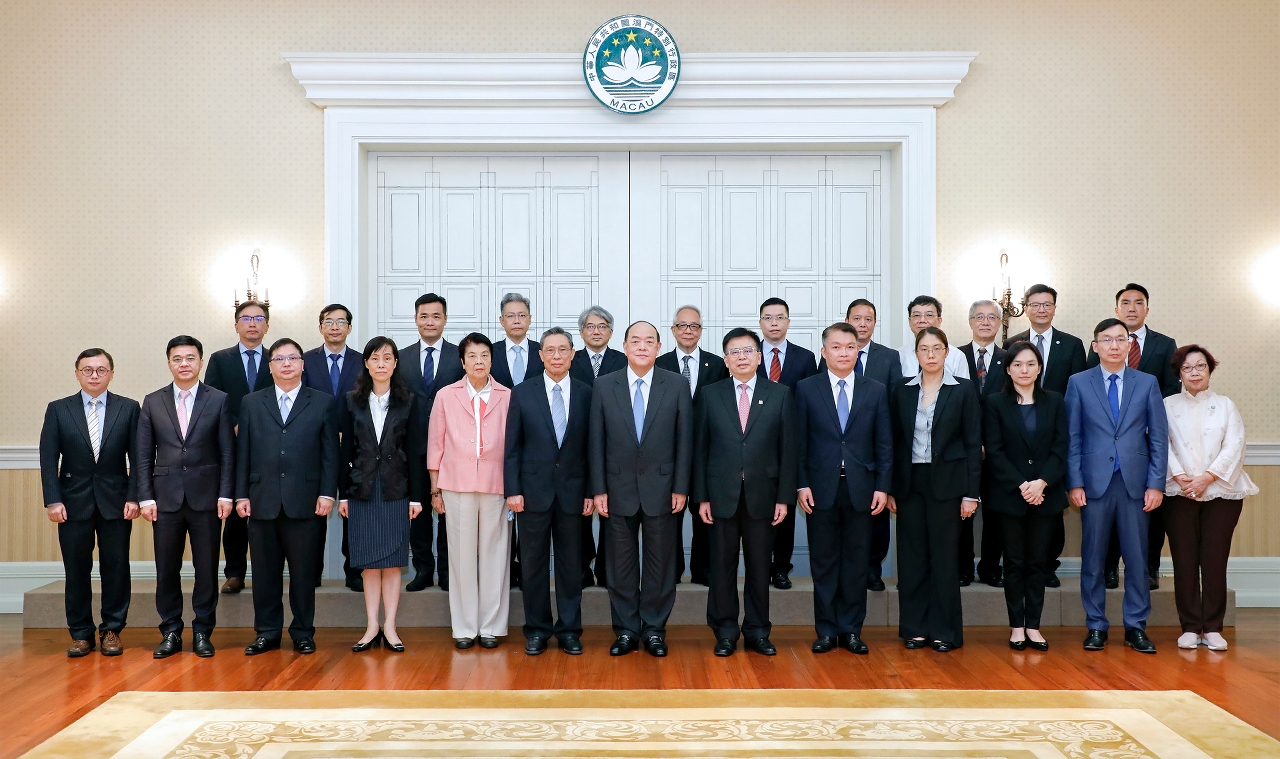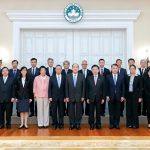 The Chief Executive, Mr Ho Iat Seng, poses for a group photo with member of the Chinese Academy of Engineering, Mr Zhong Nanshan, after a meeting held at the Government Headquarters in Macao.
The Chief Executive, Mr Ho Iat Seng, poses for a group photo with member of the Chinese Academy of Engineering, Mr Zhong Nanshan, after a meeting held at the Government Headquarters in Macao.
The Chief Executive, Mr Ho Iat Seng, said Macao would press ahead with the commercialisation of knowledge and products linked to the local traditional Chinese medicine sector, and with the promotion of synergies between traditional Chinese medicine and the healthcare industry.
The Government would dedicate further effort to garner information from the mainland and from overseas with regards to standards for prescription of traditional Chinese medicine treatments, and the development of specialised legal frameworks and registration systems for this field. That was in order to speed up local legislative efforts aimed at strengthening supervision and regulation of traditional Chinese medicine.
Mr Ho made the remarks in a recent meeting in Macao with a member of the Chinese Academy of Engineering, Mr Zhong Nanshan. Mr Zhong is also the Director of the National Clinical Research Centre for Respiratory Disease and head of the National Health Commission's high-level expert team regarding COVID-19.
In the meeting, the Chief Executive thanked Mr Zhong for visiting Macao and providing guidance on the development of innovative industries linked to new technologies, while also sharing his views on the commercialisation of research outputs from tertiary education institutions in Macao. Mr Zhong’s visit would also help boost the morale of healthcare professionals in Macao amid the ongoing COVID-19 pandemic, Mr Ho added.
Mr Zhong stated the challenges posed by the COVID-19 health alert had helped to highlight the research capabilities of the city’s higher education sector in the fields of science technology and traditional Chinese medicine. These nascent industries could contribute towards Macao’s effort to achieve adequate economic diversification beyond tourism and gaming, in turn promoting the city’s competitiveness.
Mr Zhong noted that the successful implementation of the “One country, two systems” principle in the Macao Special Administrative Region (SAR) provided the city with competitive advantages. He suggested introducing to Macao projects that had had their respective initial stage successfully conducted in the mainland, such as projects related to elderly care services integrated with medical care. Such efforts could help accelerate the development of these projects from research stage to full commercialisation.
Mr Zhong noted that some projects by local tertiary education institutions had already achieved positive results, and had conditions for entering commercialisation. He also suggested greater cooperation between higher education institutions in the Guangdong-Hong Kong-Macao Greater Bay Area in order to accelerate the commercialisation of their research outcomes.
During the meeting, the Chief Executive said that the Macao community widely supported the Government’s efforts in promoting the city’s economic diversification. The Government would spare no effort in advancing established and nascent industries, and devoting extra effort to the development of innovative industries linked to science technologies. It was believed such industries could have a positive effect in Macao’s efforts to diversify its economy.
The Government would invest more resources into tertiary education, Mr Ho added. The Government had continuously supported local higher education institutions in their research efforts, having instructed them to pay greater attention to the commercialisation of their research outputs, in a bid to promote Macao’s economic diversification.
Also present in the meeting were the Secretary for Economy and Finance, Mr Lei Wai Nong, and officials respectively from Macao’s economy and trade promotion departments.


